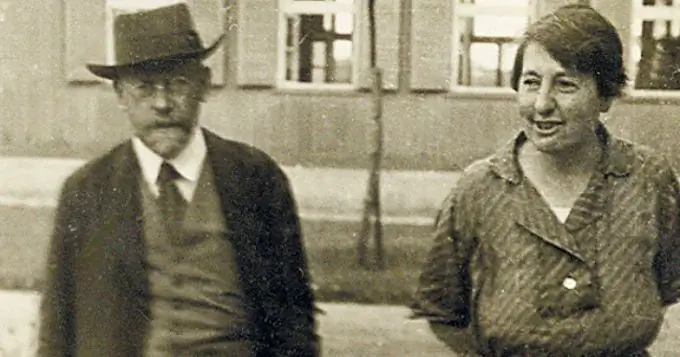- Author Antonio Harrison harrison@cultureoeuvre.com.
- Public 2023-12-16 07:44.
- Last modified 2025-01-22 21:44.
There are figures in world history who are not involved in victories in battles or in the accumulation of fabulous capital. There are few such people, but they serve as an example of humanity and fortitude. Janusz Korczak is a doctor, teacher and writer. Every decent person should know his name and life path.

Thorny path of knowledge
Janos Korczak was born in Warsaw. As some advanced historians point out, in a Jewish family that assimilated into the Polish population. The child was born on July 22, 1878. The birth register contains the name given to the boy by his parents at birth - Ersh Henrik Goldschmit. Many years later, as a mature man, he adopted the pseudonym Janusz Korczak. The Kingdom of Poland at that time was an integral part of the Russian Empire. Henryk received his primary education at a Russian gymnasium. The morals here were harsh, but the students received high-quality knowledge.
The teenager had, as they say, on his own skin to experience all the "delights" of the stick discipline. Natural human love was perceived here as a manifestation of weakness. The biography notes that the boy studied well, read a lot, translated poetry and tried to write himself. In the meantime, my father became seriously ill and was admitted to a paid clinic. The family budget has become significantly depleted. The high school student had to look for a job. Already at the age of 15, Henrik began to engage in tutoring. It is interesting to note that he taught classes for his peers.
In 1898, after graduating from high school, the future doctor and writer entered the medical department of the University of Warsaw. In the same year, he wrote a play called "Which Way?" and signed by the pseudonym Janusz Korczak. As it was then accepted, the student is also interested in the peculiarities of the work of educational and medical institutions. In the spring of 1905, a doctor who received a diploma was drafted into the army and sent to the Far East - there was already a war with Japan. Long-distance trips allow Janush to learn how ordinary people live and how adults relate to children. In most cases, he is not happy with what he sees.
How to love a child?
In 1910, Korczak decided to leave his medical career and devote himself to teaching. Using his authority, he collected the necessary capital from patrons and built an orphanage for street children. The four-storey building was erected according to a project that was developed under the direct supervision of Janusz Korczak. However, with the outbreak of the First World War, he was again called up for military service. For some time he had to work as a doctor in Kiev, where the doctor treated the children who ended up in orphanages. It was here that he put his view on the topic "How to love a child" on paper. This small book has not lost its relevance in our time.
When it comes to the personal life of Janusz Korczak, it is not possible to find intelligible information. Monographs have been written and films have been made about the fate of the teacher, about the orphanage, about the children who grew up there. Yes, Janusz had a close and faithful assistant named Stefania Vilchinskaya. Yes, they shared all the worries, all the work of caring for children in half, as a husband and wife do. The Orphanage could not have lived without a mother like Stephanie.
The Second World War surpassed all previous wars in the history of Earth civilization in the cruelty and senselessness of the destruction of people. One of the dreaded mainstreams of the period was anti-Semitism. The Nazis killed all Jews, regardless of gender or age. When the Sonderkommando surrounded the orphanage and began to take the pupils out to be sent to the camp, their mentor went there too. The executioners offered him to stay, but he refused. All the children from the orphanage, Janos Korczak and Stefania Vilczynska, died in the gas chamber of the Treblinka camp.






